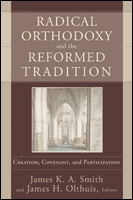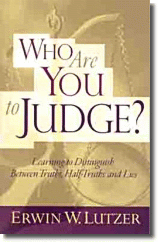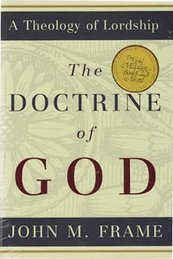
What exactly is Radical Orthodoxy (RO hereafter)?
RO calls itself a critical Augustinian movement, and much of their theoretical and political critique picks up where Augustine’s City of God left off, taking on Nietzchean and post-Nietzschean philosophy, international capitalism, and the modern nation-state in the same manner that Augustine took on Rome and her many gods and philosophers. Theology and Social Theory begins by with the claim that social theories that call themselves secular are most often either heretical versions of Christian theological claims or paganism disguised in the language of science. Subsequent books in the RO tradition expand on these claims in the arenas of city planning, economics, linguistic theories, the national security state, and several other fields that demand both practical insight and theoretical acuity.(Source: http://www.theooze.com/articles/article.cfm?id=1029)
Radical Orthodoxy is an ambitious movement of intellectuals pitched against secular modernity and its denial of the transcendent.(Source: The Spirit of Things with Rachael Kohn on Sunday 7/11/99)
From I found out, the term "Radical Orthodoxy" was not coined until the mid-to-late 90's. The first book to be published under that title was a collection of essays titled "Radical Orthodoxy: a new theology", which came out in '99. Since then, that there has actually been an academic "series" of books (Milbank, Pickstock, Ward, Cunningham, Long, Smith, Bell, Rowland et. al.).
RO is a movement that has emerged at the cutting-edge of theology and postmodern philosophy.
".... the concern for RO theologians extends beyond a critique of the modern state and its operations; it extends to why we as Christians must recognize what modernity (with its liberal state and free market) is really up to. So in the words of William Cavanaugh (the most accessible RO theologian):
The invention of religion as a private leisure activity allows people to fit into the state and market without conflict, … Private religion is meant as a refuge, a solace for tired shoppers and harried office workers. Religion helps us escape from or cope with, but not change, the frenetic pace of life in consumer society." (Source: Ashley Woodiwiss's article)
In explaining what is Radical Orthodoxy, Gregory F. McCormick wrote that:
- RO tends to refuse dualities of faith and reason and of nature and grace, resisting the idea of a purely fideistic, biblically-based narrative theology that is innocent of metaphysics and ontology.
- RO refuses natural theology and a lot of the usual approaches pursued in contemporary analytic philosophy of religion.
- RO intimates that analytic philosophy of religion pays no real attention to central developments in twentieth-century philosophy, analytic as well as continental.
- RO believes that it is very important to have both a rooting in biblical exegesis, and an interest in speculative reflection. It sees no vast difference between the narrative imagistic mode of the bible, and philosophical discourse “about” the bible because there is, despite everything, something like philosophy in the bible; conversely, Greek philosophy is very closely linked to mythology, narrative and history.
- The other major orientation in radical orthodoxy is towards post-modernism.
- RO is so unapologetically committed to exploring metaphysical questions in detail as it believe that their neglect (or rejection) by theology leaves Christianity as a set of weird, ultimate beliefs in which Christians simply believe in life after death, which is an attitude that does not seem to connect with the perceived facts of the world.
- RO resists the idea that we should give up on the cosmological, since such an abandonment would be to try and occupy a purely humanist space, which has now been overturned.
James K.A. Smith, of the Kuyperian Dutch Reformed tradition says:
RO is advocating a distinctly theological engagement with the world - and the academy that investigates this world - undergirded by the belief that the way to engage the contemporary world is not by trying to demonstrate a correlation between the gospel and cultural values but rather by letting the gospel confront these (apostate) values...The truth telos [goal] of the RO project is not simply a theology but a comprehensive Christian account of every aspect of the world - a properly and radically Christian account of social relationships, economic organization, political formation, aesthetic expression, and so on, engendering a radically Christian sociology, a radically Christian economics, and so forth....Because of this conviction, RO had (in)famously eschewed 'dialogue' with secular discplines. Unlike correlationist strategies that defer the 'truth' of the natural sphere to secular sciences...RO claims that there is not a single aspect of human existence or creation that can be properly understood or described apart from the insights of revelation.
However, if we want to know more on what this movement is about—its key thinkers and their texts, its strengths, and its weaknesses—then, James K.A. Smith's recently published volume, Introducing Radical Orthodoxy (Baker Books, 2004) fits our purpose.
Smith announces at the outset that he writes for three audiences:
1) the academy of theorists, graduate students, and advanced undergraduates; 2) theologians, both in the movement itself and in the Reformed tradition (in which Smith places himself); and
3) the church, in particular its pastors, worship directors, and other leaders.
So, I think this book shouldn't be too difficult!!
Radical Orthodoxy and the Reformed Tradition: Creation, Covenant, and Participation
Often, it is difficult for a dialogue between different theological traditions to take place. It is not easy to genuinely engage another tradition nondefensively, and with both charity and firmness. This book is a good example of this aspect which many who engages in dialogue seriously need.
Author: James K. A. Smith and James H. Olthuis, eds.
Edition: Paperback
Number of Pages: 304
Description:
In this work, leading scholars compare the differences and points of intersection between Radical Orthodoxy and the Reformed tradition.
James K. A. Smith and James H. Olthuis compiled this volume with the goal of mutual interaction, "expecting that RO could offer corrective lenses for some myopic aspects of the Reformed tradition, but we also thought there were ways in which RO could use a little reforming." More specifically, this timely discussion deals with many topics in current scholarly theological and philosophical debates, including participation, aesthetics, politics, covenant, and cultural theory. It represents an emerging willingness among RO proponents to examine and engage the Dutch Reformed tradition, and Calvin in particular, as well as the growing influence of RO on the Reformed tradition.
The book includes contributions from leading proponents of RO as well as leading Reformed scholars:
James K. A. Smith
John Milbank
Graham Ward
Robert Sweetman
Adrienne Dengerink Chaplin
Michael Horton
Lambert Zuidevaart
Jonathan Chaplin
Hans Boersma
Laura Smit
Nathan Kerr
Justin Holcomb
George Vandervelde
James H. Olthuis
This book offers a constructive dialogue that will appeal to scholars concerned with the intersection between RO and the Reformed tradition. A companion book to Smith's recently published Introducing Radical Orthodoxy, it will also be of interest to upper level college and seminary students of philosophy and theology.
Author Information:
James K. A. Smith (Ph.D., Villanova University) is associate professor of philosophy and director of the Seminars in Christian Scholarship at Calvin College. He is the author of Introducing Radical Orthodoxy and Speech and Theology.
James H. Olthuis (Ph.D., Free University) is emeritus professor of philosophical theology at the Institute for Christian Studies in Toronto. He is the author or editor of numerous books.
Endorsements: "The essays in this collection undertake a new sort of ecumenical theology based not on mutual concession but on the positive collective forging of a genuinely reformed Catholicism and a genuinely Catholic reform."--Catherine Pickstock, lecturer in the philosophy of religion, University of Cambridge
"This collection of essays constitutes an important and admirable dialogue between proponents of Radical Orthodoxy and the Reformed tradition, displaying areas of convergence as well as raising questions that require further discussion. While the book will be of particular interest to those committed to Radical Orthodoxy and/or the Reformed tradition, it should also be helpful to readers from all traditions who are interested in engaging and appropriating the insights of Radical Orthodoxy in the context of their own confessional commitments."--John R. Franke, professor of theology, Biblical Theological Seminary
"Attempts at dialogue between different theological traditions are more often failures than not as representatives of the different traditions defensively talk past each other. Radical Orthodoxy and the Reformed Tradition is a signal exception. The participants in the dialogue genuinely engage each tradition nondefensively with both charity and firmness. The result is not only fascinating but also informative. Each tradition gets illuminated in the process, surprising convergences appear, differences are explored, and the options are clarified. It is a great contribution."--Nicholas Wolterstorff, Noah Porter Professor Emeritus of Philosophical Theology, Yale University
Information on RO:
Gregory F. McCormick's Radical Orthodoxy.
The Spirit of Things with Rachael Kohn on Sunday 7/11/99:
Rejecting Modernity: Radical Orthodoxy
Ashley Woodiwiss's article What's so Radical about Orthodoxy? Introducing Introducing Radical Orthodoxy and the project to "re-narrate" reality without the word secular.
John Milbanks's Radical Orthodoxy; A New Theology. (Routledge, 1998)



2 comments:
Sounds more promising than generous orthodoxy to me! :)
While Brian D. McLaren's book has been crticised on several points, for which I largely agree, I think McLaren's book does has some points worthy of our consideration. "Emergence is convergence at some levels."
Whether it is the Missional, Evangelical, Protestant, Liberal,Conservative, Biblical, Charismatic/Contemplative, Fundamentalist/Calvinist, Anabaptist/Anglican, Methodist, Catholic or Emergent "brand", I think there is always something worth learning from each of them. However, learning is one thing. Things which are non-biblical should still be rejected.Being too generous is never a good thing!!
For example, on Page 28 of his bk, he wrote "how we can search for a kind of truth you can never fully get into your head, so instead you seek to get your head (and heart) into it." To me, he is rejecting the idea that we can have a consistently accurate orthodoxy from the Scripture.In his view Christians are unable to know absolute truth from the Bible, all we can is search the Christian experience to find "a kind of truth." To me, this can become very dangerous as who or what is to guide us, if we reject the unchangeable bible? How should we discern?
His concluding chapter too contain shocking statements rejecting the sufficiency of the bible. For example, he tells us "To be a Christian in a generously orthodox way is not to claim to have truth captured, stuffed and mounted on the wall."
I think one review of McLaren's book is right when he says "discerning what they actually believe is far more difficult than finding what they do not believe". Some say McLaren abandons almost all the fundamental doctrines of the faith.Some say "There is no unbiblical doctrine anywhere in the book.I feel they are all be right in some aspect, but on points such as Sola Scriptura, hell and biblical inerrancy, the clear biblical distinctives are certainly not taught/emphasized. This may be what he intended, but being unclear can be hazardous to the health of the Church.
For example,in the introduction McLaren states that he has gone out of his way to be "provocative, mischievious, and unclear, reflecting my belief that clarity is sometimes overrated, and that shock, obscurity, playfulness, and intrigue (carefully articulated) often stimulate more thought than clarity." (Page 23)
and also, Scot McKnight also point out another observation:
And here’s what I observe about converts. Those who leave the evangelical Protestant world do so to find Tradition and Church; those who leave the Orthodox tradition find a non-ethnic, personal faith; those who leave the Catholic Church find a personal, vibrant, music-loving worship.
Like Scot McKnight,I think the Church’s theology should no longer be a set of lines but a set of lives that turn the lines into bold, believable, beautiful lives.
Post a Comment